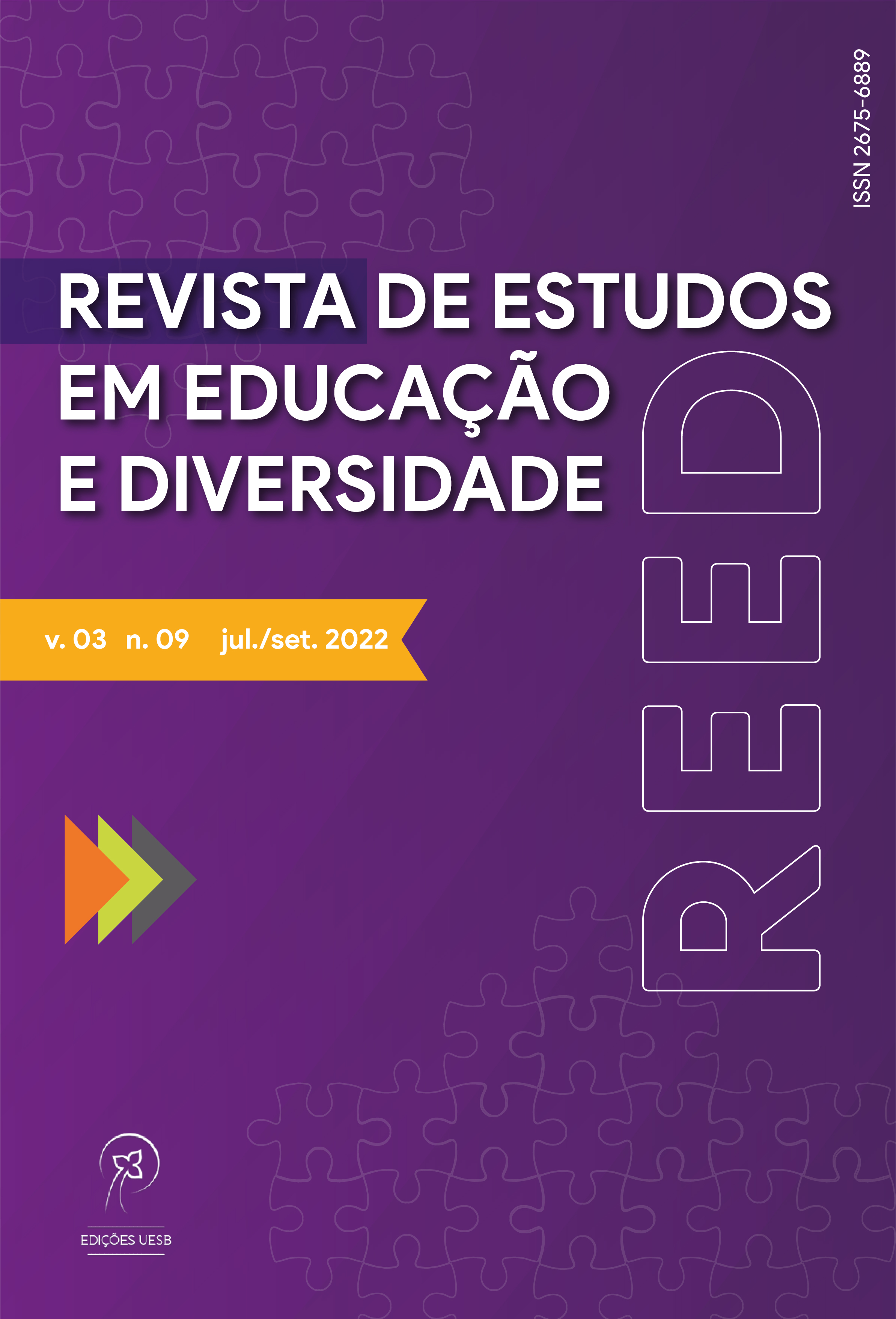A CONSTRUÇÃO HISTÓRICA DA INFÂNCIA E O SURGIMENTO DA EDUCAÇÃO INFANTIL: DO ASSISTENCIALISMO AO DIREITO
DOI:
https://doi.org/10.22481/reed.v3i9.11396Palavras-chave:
Infância., Educação Infantil., Assistencialismo., Direito.Resumo
As crianças nem sempre foram alvos de cuidado e proteção, pois antes se tinha a ideia de que os pequenos seres humanos eram adultos em miniatura. No entanto, a história da humanidade é mercada por transformações que impactam no modo de pensar e agir na sociedade, o que leva a mudanças no modo de vida dos indivíduos. Dessa forma, transitamos de uma concepção em que adultos e crianças não tinha diferença para o entendimento das necessidades específicas que esta etapa da vida apresenta. Inclusive, compreendendo a importância de uma instituição fora do âmbito familiar para o atendimento dos indivíduos na etapa da infância. Assim, a partir de uma abordagem qualitativa, este texto tem por objetivo apresentar uma análise do surgimento da ideia de infância, das instituições de Educação Infantil no Brasil e as transformações que levaram o atendimento a partir de concepção assistencialista até o entendimento da criança como cidadã e o acesso as instituições como um direito. Por fim, consideramos que mesmo com inúmeros avanços na atualidade a Educação Infantil, instituída como direito, ainda carrega alguns desafios a serem superados.
Downloads
Referências
ABRAMOWICZ, Anete. Introdução- Panorama atual da Educação Infantil: suas temáticas e políticas. In: ABRAMOWICZ, Anete. HENRIQUES, Afonso Canella (orgs). Educação Infantil: a luta pela infância. Campinas, SP: Papirus, 2018. p. 13-51.
ARIÈS, Philippe. História social da criança e da família. Tradução de Dora Flaskman. 2. Ed. [Reimpre.]. Rio de Janeiro: LTC, 2018.
BRASIL. Lei 2.848/1940 (DECRETO-LEI) 07/12/1940. Código Penal brasileiro.Rio de Janeiro, RJ: Presidência da República. [1940] Disponível em: http://www.planalto.gov.br/ccivil_03/decreto-lei/del2848compilado.htm. Acesso em: 02 fev. 2020.
BRASIL. [Constituição (1988)]. Constituição da República Federativa do Brasil. Brasília, DF: Presidência da República. [1988]. Disponível em: http://www.planalto.gov.br/ccivil_03/constituicao/constituicao.html. Acesso em: 18 maio. 2019.
BRASIL. Estatuto da Criança e do Adolescente. Lei nº 8.069, de 13 de junho de 1990. Brasília, DF: [1990]. Disponível em: http://www.planalto.gov.br/ccivil_03/leis/l8069.htm. Acesso em: 02 jan. 2020.
BRASIL. Lei nº 9.394, de 20 de dezembro de 1996. Lei de Diretrizes e Bases da Educação Nacional: que estabelece as diretrizes e bases da educação nacional. Brasília, DF: [1996]. Disponível em: https://www.planalto.gov.br/ccivil_03/Leis/L9394.htm. Acesso em: 03 jan. 2020.
CAMPOS, Maria Malta. A mulher, a criança e seus direitos. Cadernos de Pesquisa, n. 106, p.117-127, março/1999. Disponível em: https://www.scielo.br/j/cp/a/dG4c4PNgJfqQL49gYs89wxK/?format=pdf&lang=pt. Acesso em: 10 mar. 2020.
CURY, Carlos Roberto Jamil. Educação infantil como dever do estado. In: ABRAMOWICZ, Anete; HENRIQUES, Afonso Canella (orgs). Educação Infantil: a luta pela infância. Campinas, SP: Papirus, 2018. p. 55-79.
FERREIRA, Lucimar Gracia; FERREIRA, Lúcia Gracia; BARRETO, Denise Aparecida Brito; Teixeira, Daiane Santana. Infância e Educação Infantil: história, desafios e reflexões no campo de pesquisa. In: SEMINÁRIO INTERNACIONAL POLÍTICAS PÚBLICAS, GESTÃO E PRÁXIS EDUCACIONAL (GEPRÁXIS), 2., 2017, Vitória da Conquista, BA. Anais [...] v. 6, n. 6. Vitória da Conquista, BA: UESB, 2017. p. 2623-2633. Disponível em: http://anais.uesb.br/index.php/semgepraxis/article/viewFile/7385/7160. Acesso em: 20 set. 2022.
FREIRE, Maria Martha de Luna; LEONY, Vinícius da Silva. A caridade científica: Moncorvo Filho e o Instituto de Proteção e Assistência à Infância do Rio de Janeiro (1899-1930). História, Ciências, Saúde – Manguinhos, Rio de Janeiro, v.18, supl. 1, dez. 2011, p.199-225. Disponível em: https://www.scielo.br/j/hcsm/a/pMzXR6Xv9xBJgG9gyc4ZrZv/?format=pdf&lang=pt Acesso em: 02 fev. 2020.
FREIRE, Zildiane de Jesus; FERREIRA, Lucia, Gracia. Saberes e fazeres de professoras da educação infantil. REVISTA FORMAÇÃO@DOCENTE - Belo Horizonte, v. 12, n. 2, julho/dezembro 2020. p.1-25. Disponível em: https://www.metodista.br/revistas/revistas-izabela/index.php/fdc/article/view/1805/1146. Acesso em: 23 jan. 2021.
KRAMER, Sonia. Privação cultural e educação compensatória: uma análise crítica. Cadernos de Pesquisa, São Paulo, n.42, ago., p. 54- 62, 1982. Disponível em: http://publicacoes.fcc.org.br/index.php/cp/article/view/1550/1549. Acesso em: 05 nov. 2020.
KUHLMANN JR, Moysés. Infância e Educação Infantil: uma abordagem histórica. 7 ed. Porto Alegre: Mediação, 2015.
MARCILIO, Maria Luiza. A roda dos expostos e a criança abandonada na história do Brasil: 1726-1950. In: FREITAS, Marcos Cezar de. (Org.) História social da infância no Brasil. 9. ed. São Paulo: Cortez, 2016. p.69-97.
PASCHOAL, Jaqueline Delgado. MACHADO, Maria Cristina Gomes. A história da educação infantil no Brasil: avanços, retrocessos e desafios dessa modalidade educacional. Revista HISTEDBR, On-line, Campinas, n.33, p.78-95, mar. 2009. Disponível em: https://periodicos.sbu.unicamp.br/ojs/index.php/histedbr/article/view/8639555/7124. Acesso em: 10 mar. 2020.
PINAZZA, Mônica. SANTOS, Maria Walburga. Crianças, Educação Infantil e obrigatoriedade. In: ABRAMOWICZ, Anete. HENRIQUES, Afonso Canella (orgs). Educação Infantil: a luta pela infância. Campinas, SP: Papirus, 2018. p. 109- 124.
PRIORE, Mary Del. O cotidiano da criança livre no Brasil entre a colônia e o império. In: PRIORE, Mary Del. (org.) Histórias das crianças no Brasil. 7. ed. 4 reimpressão. São Paulo: Contexto, 2018. p. 84-106.
SANTOS, Helder Neres; FERREIRA, Lúcia Gracia. Trabalho docente na educação infantil: para pensar a formação dos professores. Fragmentos de Cultura, Goiânia, v. 29, n. 1, p. 96-109, jan./mar. 2019. Disponível em: http://seer.pucgoias.edu.br/index.php/fragmentos/article/view/6728/4217. Acesso em: 07 jan. 2021.
Downloads
Publicado
Como Citar
Edição
Seção
Licença
Copyright (c) 2022 Revista de Estudos em Educação e Diversidade - REED

Este trabalho está licenciado sob uma licença Creative Commons Attribution 4.0 International License.
Você é livre para:
Compartilhar - copia e redistribui o material em qualquer meio ou formato; Adapte - remixe, transforme e construa a partir do material para qualquer propósito, mesmo comercialmente. Esta licença é aceitável para Obras Culturais Livres. O licenciante não pode revogar essas liberdades, desde que você siga os termos da licença.
Sob os seguintes termos:
Atribuição - você deve dar o crédito apropriado, fornecer um link para a licença e indicar se alguma alteração foi feita. Você pode fazer isso de qualquer maneira razoável, mas não de uma forma que sugira que você ou seu uso seja aprovado pelo licenciante.
Não há restrições adicionais - Você não pode aplicar termos legais ou medidas tecnológicas que restrinjam legalmente outros para fazer qualquer uso permitido pela licença.






